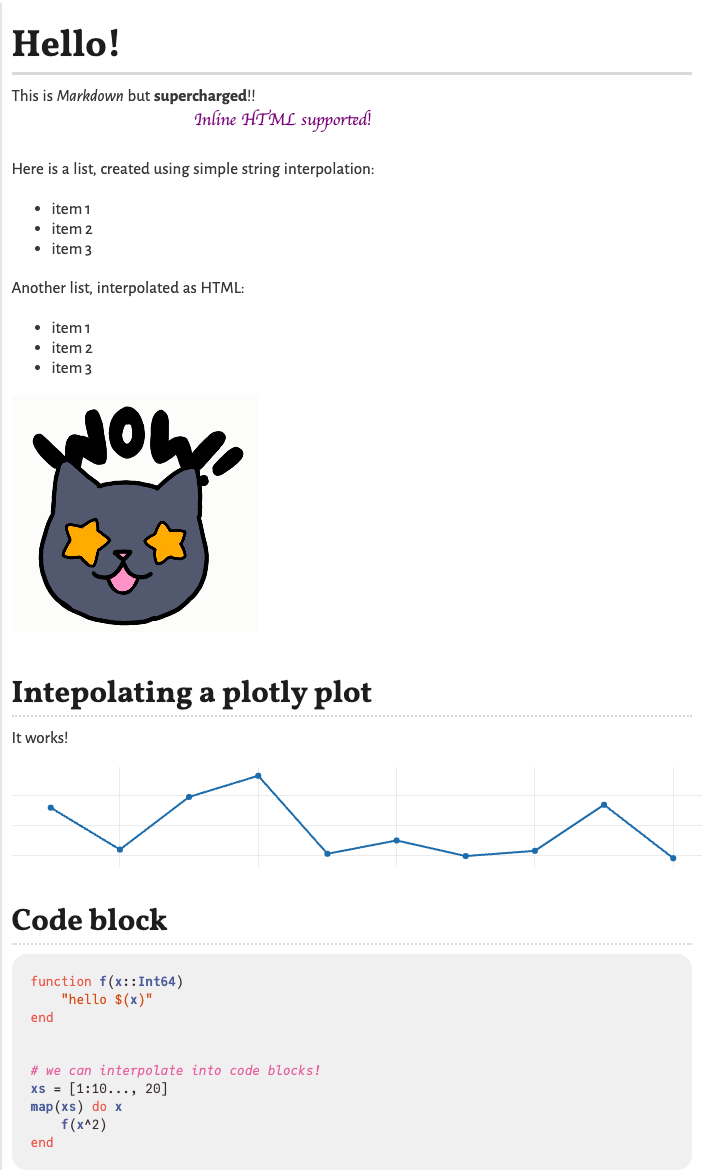https://github.com/juliapluto/markdownliteral.jl
A Markdown macro that won't let you down.
https://github.com/juliapluto/markdownliteral.jl
julia-language markdown
Last synced: 3 months ago
JSON representation
A Markdown macro that won't let you down.
- Host: GitHub
- URL: https://github.com/juliapluto/markdownliteral.jl
- Owner: JuliaPluto
- License: mit
- Created: 2021-12-16T23:29:50.000Z (over 3 years ago)
- Default Branch: main
- Last Pushed: 2024-10-04T12:58:04.000Z (9 months ago)
- Last Synced: 2025-03-22T02:22:16.579Z (4 months ago)
- Topics: julia-language, markdown
- Language: Julia
- Homepage:
- Size: 22.5 KB
- Stars: 18
- Watchers: 3
- Forks: 1
- Open Issues: 3
-
Metadata Files:
- Readme: README.md
- License: LICENSE
Awesome Lists containing this project
README
# MarkdownLiteral.jl *(alpha release)*
The macro `@markdown` lets you write [Markdown](https://www.markdownguide.org/getting-started/) inside Pluto notebooks. *Here is an example:*
```julia
import MarkdownLiteral: @markdown
```
```julia
@markdown("""
# MarkdownLiteral.jl
The macro `@markdown` lets you write [Markdown](https://www.markdownguide.org/getting-started/) inside Pluto notebooks. *Here is an example:*
""")
```
> The Markdown parsing is powered by [CommonMark.jl](https://github.com/MichaelHatherly/CommonMark.jl), a Julia implementation of the [CommonMark](https://commonmark.org/) specification. Compared to Julia's [built-in Markdown parsing](https://docs.julialang.org/en/v1/stdlib/Markdown/), this system is more *predicatable* and *powerful*.
The macro `@markdown` lets you write [HTML](https://developer.mozilla.org/docs/Web/HTML) inside Pluto notebooks. *Here is an example:*
```julia
@markdown("""
The macro @markdown lets you write HTML inside Pluto notebooks.
Here is an example:
""")
```
> HTML parsing and interpolation is powered by [HypertextLiteral.jl](https://github.com/MechanicalRabbit/HypertextLiteral.jl), an interpolation system that understands HTML, CSS and even JavaScript!
Did you see that? **It is the same macro!** But that's not all!
## Interpolation
You can unlock superpowers by combining `@markdown` with **interpolation** (using `$`). For our example, let's create some data:
```julia
films = [
(title="Frances Ha", director="Noah Baumbach", year=2012)
(title="Portrait de la jeune fille en feu", director="Céline Sciamma", year=2019)
(title="De noorderlingen", director="Alex van Warmerdam", year=1992)
]
```
Now, we can use *interpolation* to display our data:
```julia
@markdown("""
My films:
$([
"- **$(f.title)** ($(f.year)) by _$(f.director)_\n"
for f in films
])
""")
```
This gives us:
> My films:
> - **Frances Ha** (2012) by _Noah Baumbach_
> - **Portrait de la jeune fille en feu** (2019) by _Céline Sciamma_
> - **De noorderlingen** (1992) by _Alex van Warmerdam_
Alternatively, you could write this using HTML instead of Markdown (*with the same macro!*):
```julia
@markdown("""
My films:
-
$(f.title) ($(f.year)) by $(f.director)
")
$([
@markdown("
for f in films
])
""")
```
## Advanced interpolation
Because interpolation is powered by [HypertextLiteral.jl](https://github.com/MechanicalRabbit/HypertextLiteral.jl), you can use advanced features:
- Interpolated attributes are automatically escaped
- You can use a `NamedTuple` or `Dict` for the CSS `style` attribute
- Interpolating Julia objects into a `` will automatically convert to JavaScript code(!)
For
```julia
logs = [
(text="Info", urgent=false),
(text="Alert", urgent=true),
(text="Update", urgent=false),
]
```
```julia
@markdown("$((
@markdown("<div style=$((
font_weight=900,
padding=".5em",
background=log.urgent ? "pink" : "lightblue",
))>$(log.text)</div>")
for log in logs
))")
```
Result:

# Old README
> ### [DEMO NOTEBOOK](https://htmlview.glitch.me/?https://gist.github.com/fonsp/29015dc6fd9438cd164a51fe3bef117d)
<details><summary>Screenshots</summary>


</details>
# Features
The list of features is really simple to explain: it is everything that CommonMark gives, plus everything that HypertextLiteral gives! This includes:
- CommonMark! Markdown but less glitchy!
- Really flexible interpolation support with infinite nesting and syntax highlighting (since it is a `@markdown("""` macro instead of `md"""`)
- Interpolate Julia objects into `<script>` to automatically convert to JS literals
- Context-aware HTML escaping
- Automatic quote wrapping for HTML attributes
- Use a `Dict` or `NamedTuple` for the `style` attribute inside an HTML tag
# Implementation
Also cool: the code is extremely short!
```julia
macro md(expr)
cm_parser = CommonMark.Parser()
quote
result = @htl($expr)
htl_output = repr(MIME"text/html"(), result)
$(cm_parser)(htl_output)
end
end
```
It is essentially the `@htl` macro for HypertextLiteral.jl, but the result is passed through a CommonMark parser. This works, because:
- CommonMark allows raw HTML
- HypertextLiteral leaves literal content unchanged, so `hello *world*` appears exactly as-is!